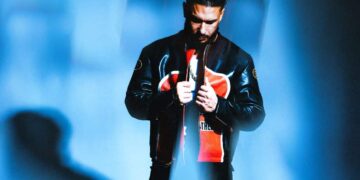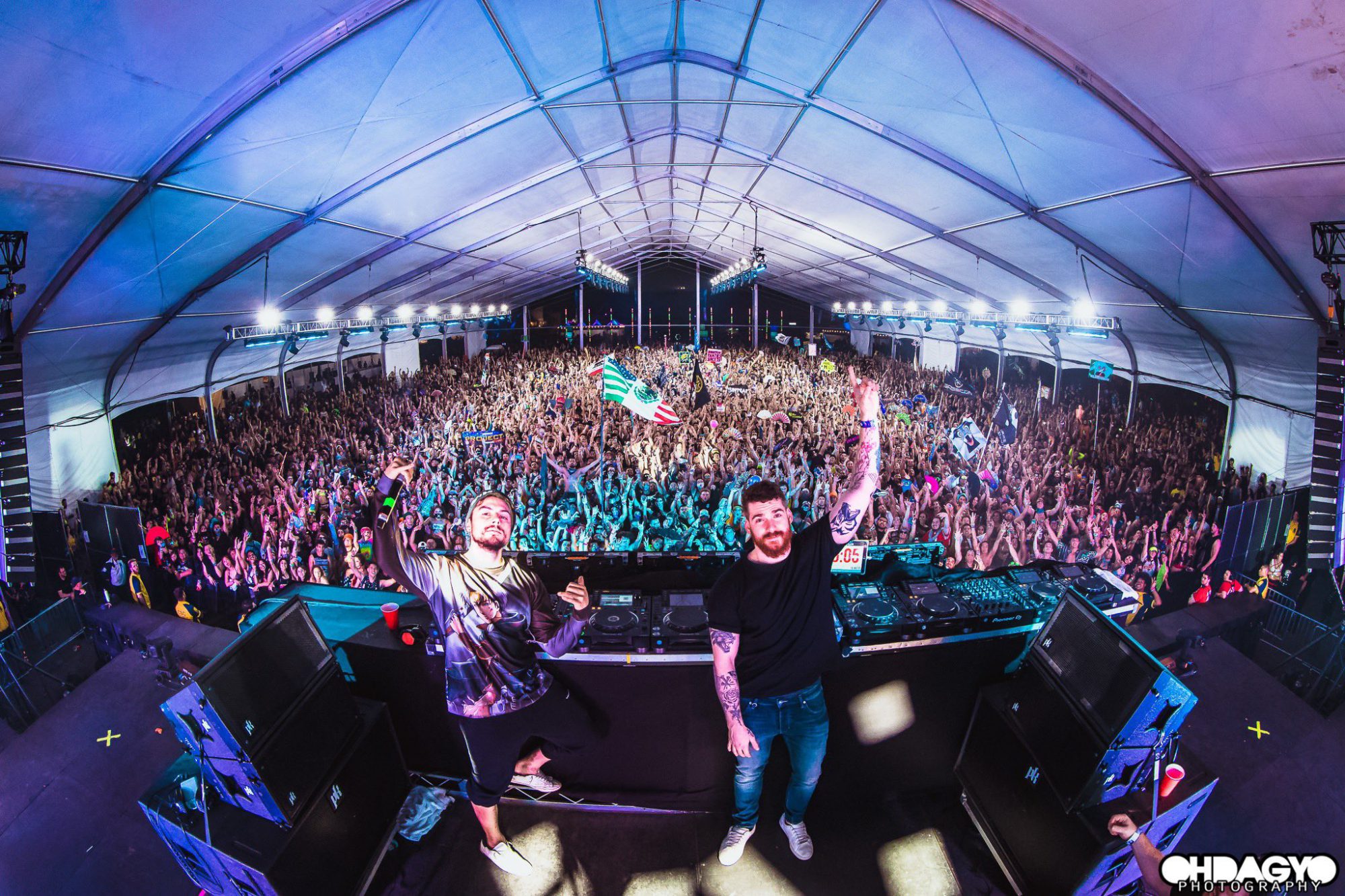Gareth Emery sat down with us after his Tomorrowland 2019 set to discuss his Tomorrowland experiences, his latest music, and how he manages his mental health.
2019 has been quite the year for Gareth Emery. On the music end, he has been writing and releasing tracks rapidly throughout the year. From his spectacular collaborative album with long-time friend Ashley Wallbridge to going back to his classic sound with Mezzanine and Aperture, Gareth Emery continues to create fresh and exhilarating tunes.
On the touring end, he’s been smashing out numerous open-to-close sets around the country as well as taking his Laserface concept internationally to Ibiza and new domestic locations such as Seattle and Minneapolis. Additionally, he’s been rounding the festival circuit and massive events such as Tomorrowland, EDC Las Vegas, Luminosity, and Creamfields.
With the massive year winding down, we wanted to chat with Gareth Emery about the future of Laserface, his thoughts on electronic music genres, how he manages his mental health, and more. Tune in to his set from Tomorrowland 2019 below and read on for his thoughts!
Listen to Gareth Emery’s Tomorrowland 2019 Set on YouTube:
Hi Gareth, thanks for chatting with us today. How do you feel playing the 15th Anniversary of Tomorrowland, and what are some of your favorite Tomorrowland memories?
This one [is my favorite] to be honest. I never seem to have a good time there. This is the exception to the rule. It’s a big festival and there’s a lot of pressure. Usually, we have other shows before and we have other shows after, so it’s always been a show with a lot of pressure without the time to really enjoy it. Over the years, we had a few times where things just went wrong.
The whole thing [with the Freedom Stage] worked out remarkably well for me. Originally I was playing after Armin, it’s indoors, and that’s a very difficult set time to play. I would have expected it to be pretty hard work whereas tonight, still coming after Armin, but it was just as it got dark.
For me, as a raver, the time of day I have always loved was when it got dark. So I was actually playing the best fucking time of day. We were really the first act to have lasers because in the day they’ve been nonexistent. So that issue of the stage ended up being kind of a blessing for us. Really, this is definitely my favorite Tomorrowland.
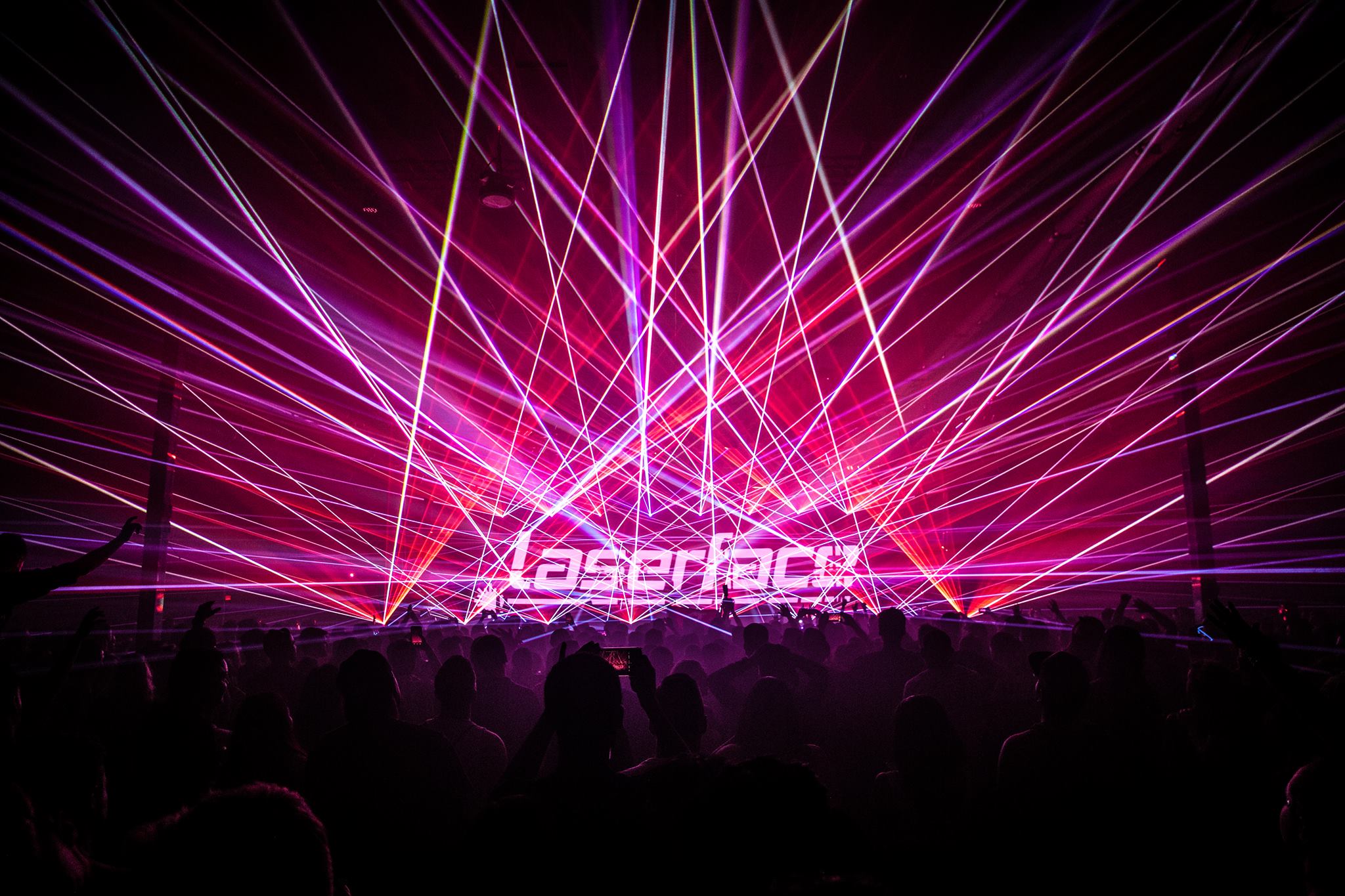
Speaking of lasers, when you first started the Laserface project, you and Anthony thought it would be a short-lived thing. However, it’s appeared at festivals and is now headed to Ibiza. What are some of the biggest challenges to making Laserface available globally?
It’s amazing just to ride the wave and know we have something that people give a shit about and want to see. For me, I recognize that, because it’s really hard to make cool things that people care about and with Laserface, we get so much demand from different places.
So, I’m just enjoying every show and enjoying being part of this thing. It’s also a great chance to play more underground at Laserface because we have so much production that kind of allows me to play like a nice progressive for the first 45 minutes. None of it would be possible without this man [Anthony Garcia].
Do you ever get concerned or afraid that more people are coming for the lasers rather than the music?
I think that absolutely will be the case in some places. But no, I mean, I don’t feel afraid so much. I mean, I think you if you go down the route of second-guessing why people are there, you can end up overanalyzing a lot of things and overanalysis is definitely a weakness of mine, so I try and avoid it.
https://www.facebook.com/academylosangeles/videos/280089379503570/
In the area of different projects, you’ve recently begun having OTC sets again, most recently in LA; what did you miss about these longer sets and what sparked this change?
The open to closes… they are demanding. The preparation is demanding, and then they’re physically demanding. You can’t do too many of them because being on the decks for six hours is different from being on the decks for an hour and a half. For me as an artist, when I feel that urge to play tracks that don’t fit in like an hour and a half, that’s when we need to bring back open-to-closes.
I loved the LA one and the early part of the night. The progressive and the first 30 minutes is almost ambient and then after that, I get to play artists I normally cannot fit. Some of my favorite artists don’t fit in my normal sets such as Solomun, Maya Jane Coles, and Eric Prydz. Then toward the end, we get more banging and get into the more of the Northern Lights era.
Give credit to Anthony Garcia as the production is a big part of it as well, and building up the production from a dark room to everything happening was done in LA pretty masterfully.
For you, how is preparing for an OTC different in comparison to short or extended sets other than when you plan your bathroom breaks?
So there’s a little hack which works pretty well for any aspiring DJ playing long sets: if you don’t drink anything for the first hour and a half or two hours, after that you can do more or less what you want and you probably won’t need to go to the bathroom. It’s almost like you become dehydrated and then your body is busy rehydrating. Once you go, you will be going every 45 minutes for the rest of the night, so spending that hour and a half just sipping on things will help you get a really strong seal.
In terms of preparation, what I prepare the least for is a two-hour set. I’ll turn up, I’ll have my playlist, and I’ll wing it with very little preparation. For open-to-close what I have to prepare for is progressive as I don’t play it every week. Also for an hour-long set, that needs a lot of preparation because you have such a short window of time to make an impact.
Moving on to your work with Ashley Wallbridge, after so many years of friendship, why did you finally decide to work on a collaborative album with him on Kingdom United?
We’ve worked together for years. The first track we did together was “Mansion” which was back in 2011, and since then we’ve kind of had an informal production partnership where we’ll just bounce things to each other. We’re very similar producers, so when we’re in the studio we have almost exactly the same taste which makes life easy.
I hope he doesn’t mind me saying this, but I’m a bit better at melodies and he is a bit better at production and the engineering side, so we both have our own strengths. It’s just been such a cool collaborative relationship so we were like, “Let’s just make 15 records together.”
How did you two meet years ago and start working together?
It was actually an ASOT event in Slovakia… Bratislava. It was around when I was doing Northern Lights, my first artist album and I had just finished the demo of “Arrival”, which I think was the opening track that night. I had done a remix for Ashley Wallbridge, who I thought was a girl at that point. Someone said Ashley wanted to meet me and I was like, “Ah cool, is she fit?” and I met her and he was a bloke. [Laughs]
We just got on really well and hit it off. It’s weird with me and Ash; our tastes are so similar. It means in the studio there’s never really a dispute. Like whatever one of us thinks the other thinks; it’s kind of like one brain which I’ve never really had that with anybody. It’s pretty unique.
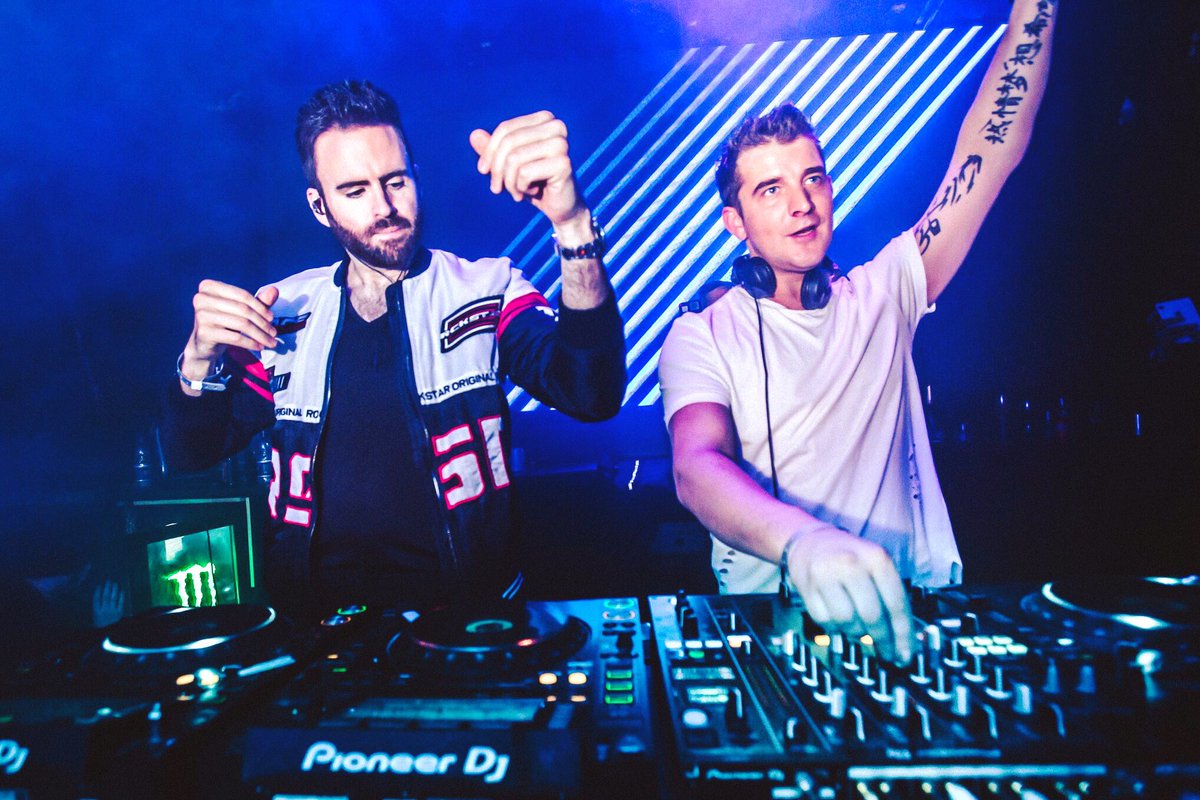
On the album, the title track and accompanying video are all about finding things that unify us all with emphasis on unification in The UK. Why did you feel this concept was important to highlight in this day and age?
It’s kind of a shitty time in the UK right now. The country is very, very divided. Obviously, I live in Los Angeles so we have a certain amount of division in the United States right now as well, but the UK is particularly divided. But when you’re in the country itself, when I’m in Los Angeles or when I’m in the UK, driving through the beautiful countryside, you don’t feel like you’re in the place that exists in the media where everyone fucking hates each other.
So I think it’s important to remember, aside from the politicians and whatever wars they are waging that seek to divide us, we’re actually more united than people think. So with Kingdom United, I wanted to show off all the things about this amazing country that we come from that overrides Brexit and the fact that we’ve been divided into these two camps.
It was just really fun; we traveled up and down the UK, drank lots of tea, and ate lots of scones. It was a little bit inspired by the “Long Way Home” video which was like a Route 66 trip — we took some inspiration from that.
Now that you have your album out with Ashley Wallbridge, do you have another solo album coming out soon?
I’ve just been writing like crazy this year. And I don’t necessarily know if it’s going to be an album or a bunch of singles, but I’ve just been on an unstoppable hot streak in the studio and I’m just going to keep it going as long as possible. Maybe albums, maybe singles, but I just enjoy writing music and writing songs and that’s it. I just really enjoy writing music right now, which is cool. I feel like I’m 22 years old again.
Over the years, you have gotten some negative comments for not being a trance purist. What is your response to those who question your choice of tracks/genres?
How long do you have? I’ll try and be short. The definition of trance is a very subjective thing. I’ve been listening to the genre for 20 years, and I have my own definition of it. But there are also people that have been listening for 25 years and have a different definition than me. I think we have to recognize that we all have our own definition of the genre which is subjective to us.
For me, I will often play tracks which I loved back in like 1998/1999 as it was when I first got into it and people will go, “Those tracks are not proper trance,” but our definition evolves over time. Back when I first started going raving, I would go to five hour Armin sets, and the first couple of hours was super progressive. It’s stuff that these days would not be considered trance but back then, it was all trance to us.
So I tend to stick to that old definition. For me, it’s always been a feeling rather than a particular set of parameters. Everything I make and play is trancey to me. Is it all trance? That’s too difficult to say. For me, it’s about the melodies and the feeling it gives you.
On the other hand, what do you find to be the benefits of not sticking to one style? Are there any drawbacks?
People like to have a box to put you in. When you book Tomorrowland, it is done by genres and not every festival is, but this one is. So if you’re primarily a trance guy, ASOT is your home; if you’re primarily EDM, Smash the House — that’s your home. And if you’re one of those guys the falls between genres, you will find getting the big festival bookings and finding your home on Beatport becomes pretty difficult.
So you know where your home is and know what genre you’re most associated with, but it’s art, and I don’t think any of us need to be overly pure about it. I say this with no judgment against people that are, and I’m not here to judge anybody else’s version of trance or electronic dance music. Whatever version somebody wants to put out there in the world, I think fair enough. It’s art, and we all have a message and it’s about delivering our message.
But it’s helpful to be tied to one genre. Trance has been my thing since I was 18 years old, so 20 years and I’ve always liked it, but I’ve always liked pushing those boundaries which is not for everybody, but that’s art.
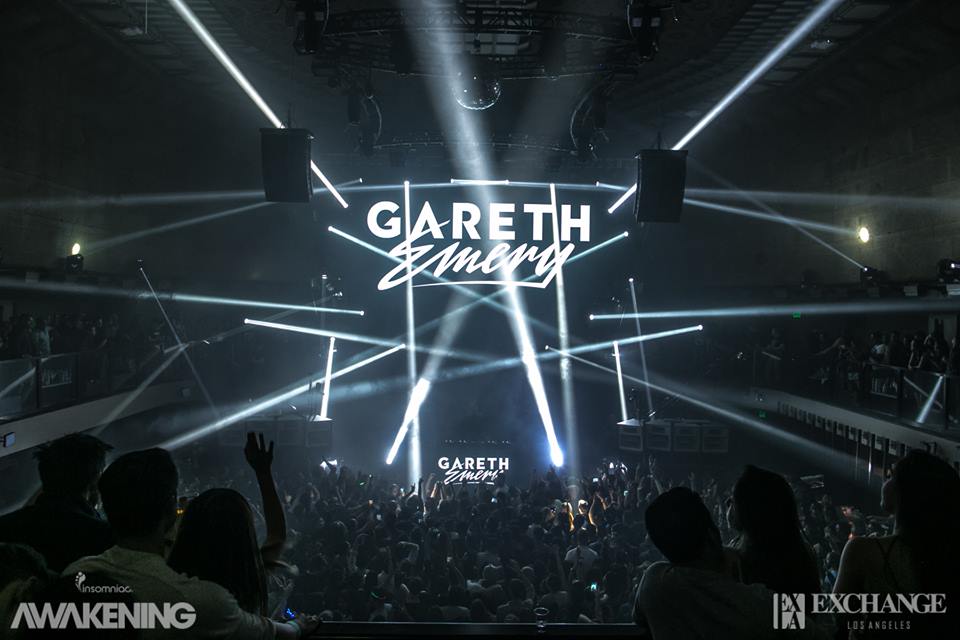
We’ve noticed lately in social media that a lot of artists have been speaking out about their mental health and how touring can put such a strain on life. You also have a family; how do you handle everything?
It’s really fucking hard and I think for artists that are newer to it, it’s definitely harder because pressures are that much higher. In some ways, it’s an unnatural lifestyle. You’re getting very little sleep, you’re staying up through the night, you’re outside normal sleep patterns and probably drinking and partying too long. You find balance as the years go on, but it’s very difficult.
It’s very easy to burn out. When artists first get big, that is the most dangerous time. It still breaks my heart that we lost Avicii when he was so young. You just think if it just managed to get through that tough period, we probably would have had another 30 years of great music from him. So yea it’s fucking tough, and I’ve definitely had my own bouts.
Avicii went so hard in those early years. The most shows I ever played in a year was like 130 or 140, which nearly broke me, and Avicii… I think he doubled that. The pressure was immense and the livelihood of a lot of people depended on him. I saw it, as I toured with him a lot when he was just starting out, and you could see he was somebody who was kind of on the brink.
At the point of the documentary, Tim was the biggest DJ in the world and it was very clear for two years who the number one was — it was him. He also was prone to overwork and he said in that documentary, “If I’m going to do this, I’m going to work like crazy. I don’t want to do it 50%, I’m going to work really hard.” His default was working really hard. So what he needed was somebody that said, “Tim, I get it that you want to do these shows but you’re not fit to do them and you need to take a time out.” It really affected me when it happened and made me take a very real look at my own touring and my life.
Did you have someone in your life like that when you were first starting out or going through troubles?
No, not really. Occasionally I would have somebody that said, like, “You’re out of control, you’re being a dick,” because when people first become big, fame gets in their heads and it takes a while to understand perspective. But ultimately, it’s got to come from me, because you reach a point where most people you know, it’s either your family or people who work for you who depend on your income. So taking time off shows means letting a lot of people down and you need to be pretty determined to go, “I need this break for me.” So it is a tough one, I very much understand where he was as a lot of people are depending on you.
Finally, how do you as a father, husband, and artist have work-life balance?
I don’t think you ever get work-life balance. If a work-life balance is spending six hours a day watching Netflix, then I don’t want that for me. I think being obsessed with your work is not a bad thing and wanting to make the best art you can is not a bad thing. So I will sleep less than I should, I will work really hard, but what I try and do is I try to be all in on whatever I’m doing.
So for instance, what we’re doing it right now, I’m not doing anything else. I’m not checking my phone, I’m not doing other things, I’m doing the interview. When I’m with my kids, I’m with my kids. When I’m in the studio, I’m not checking my email, I’m in the studio. I think being fully present and fully dedicated to whatever you do in your life, I think that is the best way of finding balance. It’s a form of mindfulness. You never get it right and you can always improve it.
Connect with Gareth Emery on Social Media:
Website | Facebook | Twitter | Instagram | SoundCloud | YouTube



